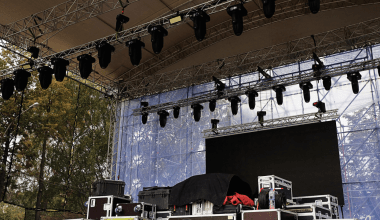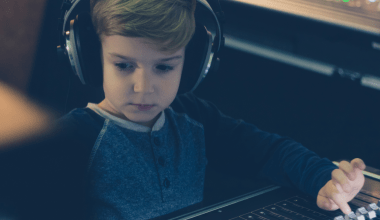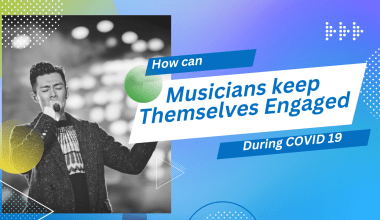The AI in music industry is no longer just a futuristic concept but a present reality that is revolutionizing how music is created, produced, and distributed. From AI-powered mastering tools to algorithms that compose original music, artificial intelligence is transforming every aspect of the music industry. This technological shift is influencing the roles of artists, producers, and even record labels, making it essential to understand the scope and impact of AI on the industry.
In the past, music creation and production were largely manual processes that required extensive time, effort, and resources. However, with the advent of AI, these processes are becoming increasingly automated and accessible. AI in the music industry is not just about efficiency; it’s about opening new creative avenues that were previously unimaginable. Whether it’s generating unique compositions or optimizing distribution strategies, AI is reshaping the landscape of the music industry in profound ways.
AI-Powered Music Composition
One of the most exciting developments in the AI in music industry is the ability of artificial intelligence to compose music. AI algorithms can analyze vast amounts of music data to create original compositions. These AI-generated pieces can range from classical symphonies to modern pop tracks, showcasing the versatility of AI in music creation. This capability has the potential to revolutionize how we think about music composition, offering tools that both complement and challenge traditional methods.
How AI Music Composition Works
AI systems are trained on large datasets of music, learning patterns, structures, and styles. Once trained, they can generate new music that mimics the learned styles or create entirely new genres. For instance, AI tools like OpenAI’s MuseNet and Google’s Magenta have demonstrated the ability to compose music across various genres. These tools use deep learning algorithms to analyze and understand the intricacies of music, such as chord progressions, melody, rhythm, and harmony.
Once the AI system has been trained, it can generate new music by predicting what should come next in a sequence of notes, based on the patterns it has learned. This allows for the creation of music that is both original and stylistically coherent. Musicians and composers can use these AI-generated pieces as inspiration, building upon them or incorporating them into their own work. The result is a seamless blend of human creativity and machine intelligence.
Benefits of AI Music Composition
- Efficiency: AI can compose music quickly, reducing the time it takes to create new songs. This is particularly beneficial for artists who need to produce a large volume of music in a short amount of time, such as for film scores, commercials, or background music.
- Creativity Boost: AI can provide fresh ideas and inspiration for human composers, pushing the boundaries of creativity. It allows composers to experiment with new styles and genres without the constraints of traditional music theory.
- Customization: AI allows for personalized music creation, tailoring compositions to specific moods, events, or audiences. For example, AI can be used to generate custom soundtracks for video games, where the music dynamically changes based on the player’s actions.
- Accessibility: AI lowers the barriers to music composition, making it possible for individuals without formal music training to create complex and sophisticated pieces. This democratizes the creative process and allows for a more diverse range of voices in the music industry.
AI in Music Production
Beyond composition, AI is also making waves in music production. The AI in music industry is enabling producers to achieve professional-quality sound without the need for expensive studios or extensive technical knowledge. AI-powered mastering tools, like those offered by Deliver My Tune, analyze and enhance tracks, ensuring they meet industry standards.
AI Mastering: Revolutionizing Sound Quality
AI mastering services automatically adjust levels, EQ, compression, and other aspects of a track to produce a polished final product. This technology democratizes music production, allowing independent artists to compete with big labels in terms of sound quality. Mastering, a crucial step in music production, traditionally required a trained ear and years of experience. However, AI has made this process more accessible and consistent.
Examples:
- LANDR: An AI-based mastering platform that offers quick and affordable mastering services. LANDR uses AI to analyze the audio and apply adjustments that enhance the overall sound quality, making it suitable for various streaming platforms.
- Deliver My Tune: Provides AI mastering that ensures consistent sound across all tracks, making them ready for distribution. This service allows artists to focus on their creative work while leaving the technical details to AI.
Benefits of AI in Music Production
- Cost-Effective: AI mastering is much cheaper than traditional studio mastering. Artists and producers no longer need to hire expensive professionals for mastering, which significantly reduces production costs.
- Time-Saving: Tracks can be mastered in minutes, allowing for faster release schedules. This is particularly important in today’s fast-paced music industry, where the ability to quickly produce and release new music can be a competitive advantage.
- Consistency: AI ensures a consistent sound across all tracks, which is crucial for albums and EPs. Consistency in production quality is essential for maintaining a professional image and satisfying listeners’ expectations.
- Scalability: AI mastering can easily scale to handle large volumes of music, making it ideal for labels and artists who produce multiple tracks or albums simultaneously.
- Objectivity: AI provides an objective assessment of the music, free from the subjective biases that human engineers might have. This can lead to a more balanced and neutral sound, which may be more appealing to a broader audience.
AI in Music Distribution and Promotion
The AI in music industry extends beyond creation and production into distribution and promotion. AI algorithms are being used to optimize music distribution, ensuring that songs reach the right audiences. These algorithms analyze listener data to recommend music to potential fans, increasing the chances of discovery.
AI-Driven Distribution: Targeting the Right Audience
Platforms like Spotify and Apple Music use AI to curate playlists, recommend songs, and even predict future hits. By analyzing listener behavior, AI helps artists reach a global audience more effectively. This targeted approach to distribution not only increases the likelihood of a song being discovered but also enhances the overall listening experience for users.
AI-driven distribution platforms utilize machine learning algorithms to track user interactions, such as skips, repeats, and likes, to create personalized playlists and recommendations. This data-driven approach ensures that listeners are presented with music that aligns with their preferences, increasing engagement and loyalty.
Benefits of AI in Music Distribution:
- Targeted Promotion: AI ensures that music reaches the right listeners, increasing engagement and streams. This targeted approach maximizes the return on investment for promotional efforts, as artists can focus on reaching the most receptive audience.
- Data-Driven Insights: Artists can use AI-generated data to understand their audience better and tailor their marketing strategies accordingly. This includes insights into listener demographics, geographic locations, and listening habits, which can inform tour planning, merchandise sales, and other promotional activities.
- Global Reach: AI-powered distribution ensures that music is accessible to listeners worldwide, breaking down geographical barriers. This global reach is essential for artists looking to build an international fan base and tap into new markets.
- Predictive Analytics: AI can predict which songs are likely to become hits, helping artists and labels make informed decisions about which tracks to promote. This predictive capability can also assist in identifying emerging trends and genres, allowing artists to stay ahead of the curve.
- Automated Processes: AI streamlines the distribution process by automating tasks such as metadata entry, cover art generation, and release scheduling. This reduces the administrative burden on artists and labels, freeing up more time for creative work.
Social media is a critical tool for artists, and AI is playing a significant role in enhancing fan engagement. The AI in music industry enables artists to manage their social media profiles more efficiently and effectively. AI tools can analyze social media trends, schedule posts, and even respond to fans in real-time.
For instance, Deliver My Tune offers social media management services that include AI-driven content creation and scheduling. This service ensures that artists maintain a strong online presence, keeping their fans engaged and growing their follower base. By leveraging AI, artists can ensure that their social media activities are both timely and relevant, increasing their visibility and influence.
AI-powered tools can analyze vast amounts of social media data to identify trends and patterns. This allows artists to create content that resonates with their audience, leading to higher engagement rates. Additionally, AI can automate the posting schedule, ensuring that content is published at optimal times when the target audience is most active.
Benefits of AI in Social Media Management:
- Increased Engagement: AI helps artists interact with their fans more frequently and meaningfully. By automating routine tasks, AI allows artists to focus on creating content that fosters deeper connections with their audience.
- Content Optimization: AI tools can analyze what type of content resonates best with fans, optimizing future posts. This includes identifying the most effective types of media, hashtags, and posting times to maximize reach and engagement.
- Time Management: With AI handling routine social media tasks, artists can focus more on their music. This is particularly important for independent artists who may not have the resources to hire a dedicated social media manager.
- Sentiment Analysis: AI can analyze fan comments and messages to gauge public sentiment. This helps artists understand how their audience feels about their music and brand, allowing them to make informed decisions about their public image and marketing strategies.
- Personalization: AI enables personalized interactions with fans, such as automated responses that feel genuine and tailored to individual users. This level of personalization can help build a loyal fan base and increase fan retention.
AI in Live Performances
AI is also transforming live music performances. The AI in music industry has introduced new ways for artists to engage with their audience during live shows. AI can create real-time visuals, enhance sound quality, and even interact with the audience, making performances more dynamic and immersive.
AI-Enhanced Performances: A New Era of Live Music
AI can generate live visuals that sync with the music, creating an immersive experience for the audience. Additionally, AI can adjust sound levels in real-time, ensuring that the performance sounds perfect regardless of the venue. This technology allows artists to push the boundaries of traditional live performances, offering their fans a unique and memorable experience.
AI-powered visual effects can be tailored to the mood and tempo of the music, creating a seamless integration between sound and sight. For example, AI can generate visuals that change in response to the music’s dynamics, creating a captivating and ever-changing backdrop for the performance.
Benefits of AI in Live Performances:
- Enhanced Experience: AI creates a more immersive and interactive experience for the audience. By combining music with real-time visuals and effects, artists can engage their audience on multiple sensory levels.
- Technical Precision: AI ensures that the technical aspects of a live performance, such as sound and lighting, are flawless. This reduces the likelihood of technical issues disrupting the performance, allowing the artist to focus on delivering a great show.
- Innovation: AI allows artists to experiment with new forms of expression, pushing the boundaries of live performances. This includes integrating AI-generated music with live instrumentation, creating a hybrid performance that blends human and machine creativity.
- Personalized Shows: AI can tailor the performance to the audience’s preferences, using data from previous shows or social media to create a setlist and visuals that resonate with the specific audience.
- Real-Time Interaction: AI can enable real-time interaction between the artist and the audience, such as adjusting the music or visuals based on audience reactions. This creates a more dynamic and engaging performance, where the audience feels like an active participant rather than a passive observer.
Challenges of AI in the Music Industry
While the AI in music industry offers numerous benefits, it also presents several challenges. These challenges need to be addressed to ensure that AI contributes positively to the music industry.
Creativity vs. Automation: Finding the Balance
One of the primary concerns is the potential loss of creativity. Critics argue that while AI can compose and produce music, it may lack the emotional depth and originality that comes from human experience. Music is often seen as a deeply personal and emotional art form, and there is a concern that AI-generated music might lack the human touch that makes music so impactful.
To address this concern, it’s essential to view AI as a tool that complements rather than replaces human creativity. AI can provide inspiration and new ideas, but the final creative decisions should remain with the human artist. By maintaining this balance, artists can leverage AI to enhance their creative process without sacrificing the emotional depth of their music.
Job Displacement: The Human Impact of AI
As AI takes over more aspects of music production and distribution, there is a fear that it could lead to job losses in the industry. Sound engineers, producers, and other professionals may find their roles diminished as AI becomes more prevalent. This concern is not unique to the music industry but is part of a broader discussion about the impact of automation on employment.
To mitigate this risk, the industry must focus on upskilling and retraining workers to adapt to new roles created by AI. For example, sound engineers could shift their focus to more specialized tasks that require human judgment and creativity, such as mixing live performances or developing new sound effects.
Ethical Concerns: Ownership and Copyright in AI-Generated Music
AI-generated music raises questions about ownership and copyright. If a machine creates a song, who owns the rights to that music? Additionally, there are concerns about AI being used to create music that mimics existing artists, potentially leading to legal disputes.
Addressing these ethical concerns requires clear guidelines and regulations regarding AI-generated music. This includes establishing who owns the copyright to AI-generated music and ensuring that AI is used responsibly to avoid plagiarism and infringement.
Dependence on Technology: The Risk of Over-Reliance
As the AI in music industry grows, there is a risk of over-reliance on technology. This dependence could stifle innovation, with artists and producers relying too heavily on AI tools rather than developing their skills. While AI can enhance the creative process, it should not replace the need for human creativity and expertise.
To avoid this, artists and producers should view AI as one tool among many in their creative arsenal. By using AI alongside traditional methods, they can create music that benefits from both technological advancements and human artistry.
The Future of AI in Music Industry
Despite the challenges, the future of AI in music industry looks promising. AI is expected to continue evolving, offering even more advanced tools for artists, producers, and labels. Here are some trends to watch:
Personalized Music: Tailoring Soundtracks to Individual Preferences
AI will likely play a significant role in creating personalized music experiences. As AI algorithms become more sophisticated, they will be able to compose music tailored to individual preferences, creating a unique listening experience for every user. This could lead to the development of custom soundtracks for everything from video games to personal playlists, enhancing the way we interact with music.
AI Collaborations: Bridging Human and Machine Creativity
In the future, we can expect more collaborations between AI and human artists. These collaborations could lead to new genres of music and innovative soundscapes that push the boundaries of creativity. By combining the strengths of both human intuition and machine precision, these collaborations could result in music that is more innovative and diverse than ever before.
AI-Driven A&R: Revolutionizing Talent Scouting
AI could revolutionize the artist and repertoire (A&R) process by identifying promising new artists and predicting trends. This could lead to a more data-driven approach to talent scouting, helping labels make better decisions about which artists to sign. AI could analyze social media activity, streaming data, and other indicators to identify emerging talent before they become widely known, giving labels a competitive edge.
Ethical AI: Ensuring Responsible Use in Music
As AI becomes more integrated into the music industry, there will be a growing focus on ethical AI practices. This includes ensuring that AI-generated music is original, respecting copyright laws, and addressing the potential impact on human jobs. By prioritizing ethical considerations, the industry can ensure that AI contributes positively to the music ecosystem.
Conclusion: Embracing AI in the Music Industry
The AI in music industry is transforming the way music is created, produced, distributed, and consumed. While there are challenges to overcome, the benefits of AI are undeniable. From enhancing creativity to democratizing music production, AI is opening up new possibilities for artists and producers. As the technology continues to evolve, the music industry must adapt and embrace AI to stay at the forefront of innovation. By doing so, artists can harness the power of AI to create music that resonates with audiences around the world, ensuring that the future of music is as dynamic and diverse as its past.
For further reading, explore these related articles:
- Navigating Content ID Claims in the Music Industry
- The Growth and Current Net Worth of the Indian Music Industry
- Entry Level Music Industry Jobs: Your Ultimate Guide to Breaking into the Industry
For additional resources on music marketing and distribution, visit Deliver My Tune.






